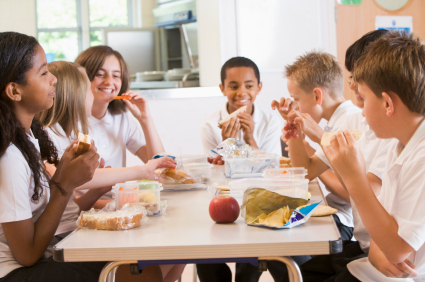Finding Balance with Food in the Classroom
 Sunday, January 1, 2012 at 6:39PM
Sunday, January 1, 2012 at 6:39PM  Melanie Potock, MA, CCC-SLP tagged
Melanie Potock, MA, CCC-SLP tagged  Plymouth,
Plymouth,  ban,
ban,  classroom,
classroom,  food allergies,
food allergies,  peanut,
peanut,  school
school  Email Article
Email Article  2 References
2 References  Print Article in
Print Article in  Going to School,
Going to School,  Parents/Kids
Parents/Kids 
Guest Tender Blogger, Melanie Potock of My Munch Bug, gives lend her advice on food in the classroom after reading a recent news article about the latest debate in Plymouth, MA schools. Melanie is the kid expert for The Tender Palate.
According to the article: "The proposal triggered some of the most heated debate the School Committee has seen in years, with some advocating for the ban in the name of student health and others complaining that the district was overstepping its bounds."
Physics 101
I was never very good in Physics 101, except for the unit on balance. Maybe that’s because I have always understood the principles of balance in our daily lives. Achieving it isn’t a simple task, but I know what it feels like. When life is in balance, it feels smooth, steady and easy. When life is out of balance, it feels inconsistent, erratic and even chaotic. Change makes us suddenly lose our balance and no one, absolutely no one, likes that feeling.
Recently, changes in school district policies regarding food being allowed in classrooms has created controversy and upset among parents, teachers and students. The pendulum has swung from allowing ALL food in the classroom to the recommendation by some that NO food be allowed in the classroom. Whoa! That’s one big push in the opposite direction. Time to find a little balance, but that requires effort. That’s why many of us don’t like change; returning to balance takes effort on our part. We’d rather just stay where we are.
Where is All of This Drama Coming From?
To find the balance, consider the following viewpoints that prompted the massive swing of the pendulum:
In Plymouth, Massachusetts, the food ban “was proposed at the start of the year to reflect changes in state and federal nutritional guidelines for schools.”
Anne Powers, the nurse leader of the Plymouth school district, had views that were not supported by the majority of parents. She cited the following reasons for banning food in all elementary classrooms:
• Increasing childhood obesity statistics
• Increasing food allergies in the student population
When the school district surveyed the parents, it was clear that the elementary school parents felt strongly that food should be allowed in their child’s classrooms:
• 80 percent of respondents were opposed to a ban on allowing food in classes for celebrations like birthday parties
• Parents felt there should be no ban on offering food as a reward and limiting the number of parties during the school day
• Respondents narrowly supported a policy that would establish an allowable food list for school celebrations
If nutrition, the national obesity epidemic and increasing food allergies require changes in our classroom to keep our children healthy and safe, yet most parents prefer little to no change in policy, what is the most efficient and effective way to find the balance?
Let's Simplify
What if we prioritized the individual issues? Perhaps by classroom rather than by school? If teachers are allowed to set the rules for their students’ needs, then the pendulum doesn’t need to swing so dramatically. By setting ground rules based on the distinct needs of the children in each class, teachers, parents and students can adjust classroom rules accordingly if they consider these two questions:
#1 Does it keep the classroom safe for all?
#2 Does it foster learning in the classroom?
It’s not a perfect solution to a complicated problem. It’s a reasonable solution. It’s one that a smaller group of parents can ultimately support for 9 months of the year, until their child moves to another classroom. Life is about compromise for the good of all. That’s called being a good neighbor.
In her article on achieving balance, Terri Trespicio writes: “Balance comes when we adapt to change, rather than try to resist it.”
Adapting to new situations or challenging issues in our society such as childhood obesity and keeping children with food allergies safe requires effort and collaboration. That feels achievable on a classroom by classroom basis. No two groups of kids are alike and one, district-wide, sweeping rule “NO FOOD IN THE CLASSROOM” certainly does not foster collaboration among the community. It creates resistance.
About Melanie
 Melanie Potock, MA, CCC-SLP, of www.mymunchbug.com. Melanie is speech language pathologist who specializes in feeding. Her work brings her into the homes and schools of her clients, kids, who for various reasons have difficulty with food or with eating. She works with kids and their parents to develop effective strategies that help children become “more adventurous eaters”. At least 50% of her clients have food allergies or intolerances, and for them, “adventurous eating” takes on a special meaning. Melanie is also the author of Happy Mealtimes with Happy Kids” and the executive producer of “Dancing in the Kitchen.”
Melanie Potock, MA, CCC-SLP, of www.mymunchbug.com. Melanie is speech language pathologist who specializes in feeding. Her work brings her into the homes and schools of her clients, kids, who for various reasons have difficulty with food or with eating. She works with kids and their parents to develop effective strategies that help children become “more adventurous eaters”. At least 50% of her clients have food allergies or intolerances, and for them, “adventurous eating” takes on a special meaning. Melanie is also the author of Happy Mealtimes with Happy Kids” and the executive producer of “Dancing in the Kitchen.”
Other Articles & Opinions On This Subject
Schools adapting, banning foods, for students with allergies
Why I Don't Believe Food Allergens Should Be Banned From Schools

